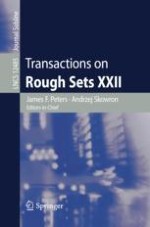2020 | OriginalPaper | Chapter
A Study of Algebras and Logics of Rough Sets Based on Classical and Generalized Approximation Spaces
Author : Arun Kumar
Published in: Transactions on Rough Sets XXII
Publisher: Springer Berlin Heidelberg
Activate our intelligent search to find suitable subject content or patents.
Select sections of text to find matching patents with Artificial Intelligence. powered by
Select sections of text to find additional relevant content using AI-assisted search. powered by
Abstract
The seminal work of Z. Pawlak [60] on rough set theory has attracted the attention of researchers from various disciplines. Algebraists introduced some new algebraic structures and represented some old existing algebraic structures in terms of algebras formed by rough sets. In Logic, the rough set theory serves the models of several logics. This paper is an amalgamation of algebras and logics of rough set theory.
We prove a structural theorem for Kleene algebras, showing that an element of a Kleene algebra can be looked upon as a rough set in some appropriate approximation space. The proposed propositional logic \(\mathcal {L}_{K}\) of Kleene algebras is sound and complete with respect to a 3-valued and a rough set semantics.
This article also investigates some negation operators in classical rough set theory, using Dunn’s approach. We investigate the semantics of the Stone negation in perp frames, that of dual Stone negation in exhaustive frames, and that of Stone and dual Stone negations with the regularity property in \(K_{-}\) frames. The study leads to new semantics for the logics corresponding to the classes of Stone algebras, dual Stone algebras, and regular double Stone algebras. As the perp semantics provides a Kripke type semantics for logics with negations, exploiting this feature, we obtain duality results for several classes of algebras and corresponding frames.
In another part of this article, we propose a granule-based generalization of rough set theory. We obtain representations of distributive lattices (with operators) and Heyting algebras (with operators). Moreover, various negations appear from this generalized rough set theory and achieved new positions in Dunn’s Kite of negations.
